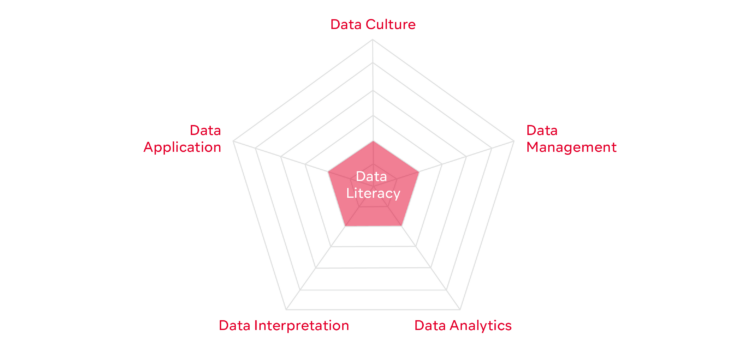
Data literacy – the most important skill for digital companies?
More and more companies want to use AI and analytics to leverage their treasure trove of data and add value. However, introducing technologies will only bring about the desired success if the data literacy of the company's employees is also developed in parallel. Dr. Valentin Kemper explains at which levels this should be done.
Making decisions on the basis of valid data, anticipating changing market requirements and reacting flexibly to them in good time, understanding customer wishes – none of this is a problem for a data-driven company. But how does a company get to that stage? Naturally, sufficient data must be available in the first place. That is the least of the challenges given the constantly growing flood of information. At the same time though, companies need employees who can handle this data competently. Today, data literacy is one of the most vital and sought-after skills that companies need to remain competitive in the long term. The expertise that is still lacking in many companies can initially be brought in-house by external experts who can provide support with their data science and AI skills. Over the long term, however, companies will not be able to avoid developing and expanding data literacy among their employees if they are to operate independently. To this end, the following five areas of expertise are of particular relevance:

The five areas of expertise of data literacy
Company-wide data culture: creating awareness of the value of data
Data should not only be used in the day-to-day operations of a department but should generate added value throughout the entire company. This is done through cross-divisional data-driven processes that are continuously optimized through artificial intelligence and automation. This can be achieved if all employees contribute to ensuring that the quality of the database remains high. They do not have to retrain as data scientists in order to do this, but they should understand how their daily work creates the foundation for automated, AI-supported processes and applications, thus reducing the burden on their day-to-day work and ensuring the success of the entire company. Data literacy training is offered to all employees so that this fundamental understanding is firmly anchored in the company.
Clean data management: ensuring data quality from the outset
In addition to an understanding of the relevance of data, there is also a need for practical skills in managing them. After all, data quality starts at the input screen of clerks in specialist departments: what types of data are there, what will they be needed for later? Where are they used in business operations and what insights and trends can be derived from them? These points influence how data are collected, made available, and managed. The issue of data protection also plays a role in archiving and processing that should not be underestimated. Targeted training for specialist departments helps to prepare employees in these fields. This helps them to create the kind of high-quality dataset necessary for AI and machine learning, and actively contributes to lowering the risk of compliance violations.
Deep data analysis: insights through modern algorithms
Analyzing terabytes of data is an extremely complex task. Fortunately, today there are helpful analytics tools that assist employees in this process. They can learn to use them for their daily tasks through special training sessions. IT professionals and analysts go several levels deeper when analyzing data across business units. Skills such as Python programming language and proficiency in NLP are indispensable. Depending on the level of existing knowledge, such skills can quickly be acquired in three-day training sessions and can also be deepened through further training on specific topics such as DevOps and MLOps.
Insightful data interpretation: deriving key success factors and measures
Once specialists have analyzed relevant data, departments and senior managers want to see and understand the results. Visualization, e.g., in dashboards of BI tools, simplifies this enormously. Various evaluations and forecasts can be displayed, e.g., the success of sales and marketing activities or the development of supply chains. The crucial factor here is which initial values are included in each case and how they are dependent on each other. This is also a competence that companies can promote in certain groups of employees through continuing professional development measures and thereby anchor it in the company.
Applying data to add value: optimizing business processes
Finally, the supreme discipline of data literacy involves the application of evaluated and interpreted data in business processes. Once processed, the data are fed back, training AI algorithms and optimizing numerous processes in the company. Where exactly do the data come into play, which use cases do they support, and how do they have to be prepared for those use cases? Those are the crucial questions that companies must answer. External consultants who bring experience from other projects can help, especially at the beginning. Over time, and with the appropriate data literacy among employees, companies can identify and implement use cases themselves.
Establish and expand data literacy in your own company
Nowadays, a company’s competitiveness hinges on the data literacy of its employees. There are suitable formats for communicating the relevant skills, both for a company-wide data culture and for the targeted professional development of individual employees. This enables companies to build the necessary skills that characterize a data-driven company and sustainably increase their competitiveness.
Would you like to enhance the data literacy in your company? We are happy to assist you with data literacy courses that are tailored to the existing knowledge of your employees. Just get in touch with us: We would be delighted to hear from you!
